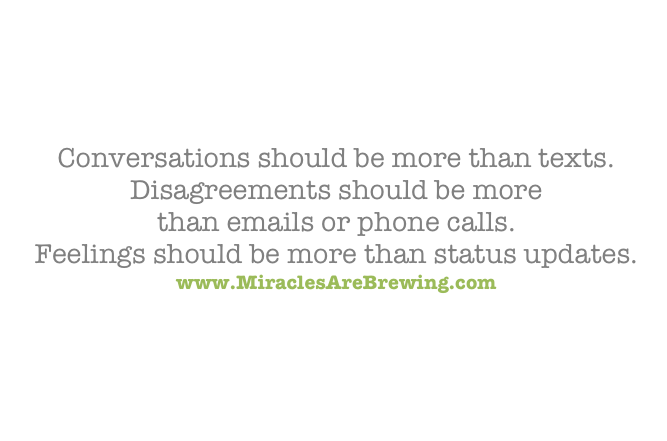In the last post, we focused on the importance of our internal conversations and how improving our inner dialogue can improve our life. This week, we’ll look at external conversations. The daily conversations we have with other people – family, friends, coworkers, elders and even strangers.
You will notice that once your internal dialogue begins to improve, your conversations with others will follow suit. The main areas I’ve seen improvements in my own conversations are a function of the thoughtfulness I try to put into motion when I’m speaking to someone, replying or reacting.
Here are some suggestions and things to keep in mind when engaging in a conversation that have been useful for me:
25 Practices to Experience More Meaningful Conversations:
1) The longer we wait to have a conversation the harder it becomes. Most of the time we are playing out scenarios in our heads that are much worse than what actually happens.
2) Speak the truth. Tell it straight up, not how you think someone wants to hear it.
3) Tell people your story, the real story, not the story you wish you were telling.
4) Speak in a way that is best for your audience, be it one person or 1000. Give some thought to how you can most genuinely connect with them. For example, if you are speaking to an older person, you will not want your conversation to be peppered with a bunch of slang.
5) Engage. A conversation is about flow. It’s a give and take.
6) Ask questions. People like to tell their story. If you want a real connection, you must know their story, even if only the scatter bits and pieces you pick up along the way.
7) Listen, attentively. Put the phone away. They are not only giving you their voice, but also their time. It’s valuable.
8) Look into people’s eyes. It shows you are interested in what they are saying and for many it is a form of respect.
9) Remember to be mindful of how it must feel to be on their side of the fence and that some day you could very well be in those same shoes.
10) It sounds silly but I remind myself of my age and then I try to act accordingly. When we reach adulthood, people tend to be less forgiving because by now we “should know better.”
11) Be easy on the curse words. Sure, I throw around an f bomb here and there, but if I’m talking to someone and every other word out of their mouth is f this and f that, I tend to take them much less seriously.
12) Think before you speak. This is a HUGE one for me. I’m an Aries. I speak my mind and sometimes my mouth is way out in front of my brain. Out of all the things I’ve learned, this is something I feel like I will constantly have to relearn. Remember, once it’s said, it can’t be taken back.
13) Conversations are tied to emotions. Everything is an emotion. Some people take things harder than others. Words affect people on so many different levels. Be gentle.
14) We are all connected by humanness. Find common ground with people. Commonalities, good or bad, are what connect us all.
15) It’s better to speak up than internalize. People are not mind readers. Women, especially, are guilty of this with their men. Trust me honey, he does NOT know what you are thinking 95% of the time.
16) Remember that friends were all once strangers. They likely became your friend because of how you treated them or a conversation you had.
17) Speak how you want to be spoken to. Oh, such a good one!
18) Know when to be assertive and when to be sweet.
19) Pick up the phone for serious talks. Hiding behind text messages is a character flaw, in my opinion.
20) Things can get lost in translation in written word, whether it is a text or an email. Try to let your personality shine through and realize that putting a “hi, how are you doing” before anything goes a long way. Read over what you are saying before firing it off. Whether it is a text or an email, read before you send.
21) NEVER respond when you are angry or upset. Give your mind time to settle down before you speak. No matter how bad the urge is, fight it. After you have calmed down, you will formulate a much more appropriate response that is more true to you.
22) Approach and delivery are two things that determine the success of a conversation. Think wisely on both before you open your mouth.
23) Remember times in the past where you have not handled similar conversations the right way and how it made you feel. Also, make note of conversations that didn’t go as you had hoped, so you can learn and be better prepared for the future.
24) Ultimately, the goal of a good conversation is to walk away feeling like you accomplished something, whether it was a new connection, a restored relationship, a new job or even a renewed sense of belonging.
25) Realize that the gift of gab is truly that…a gift. We are lucky to have people in our lives to learn from, grow with and feed off of. Conversations make the world go around. Literally. Respect the importance of all conversations, short, long, spoken or written.
Conversations shape our lives. It truly is an art form to be embraced. Communication is absolutely the key to any successful relationship.
Just as we have to practice learning a new language, we have to train our minds to speak in such a way that will allow us to have better experiences across the board. By putting these simple suggestions into your patterns of communication you will notice shifts that will enhance your everyday dynamic.
I believe the more meaningful our conversations are, the more meaningful our lives will be.

